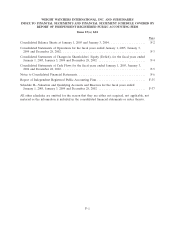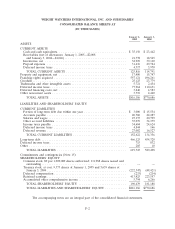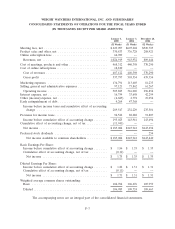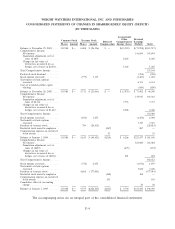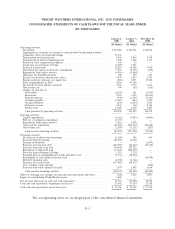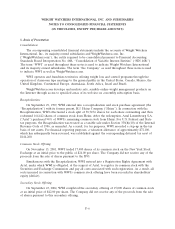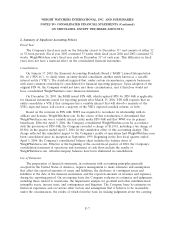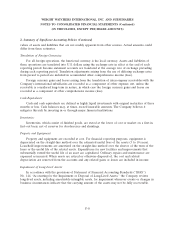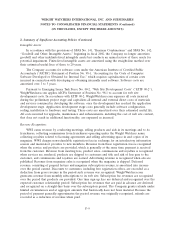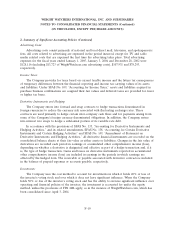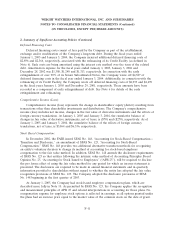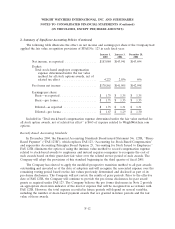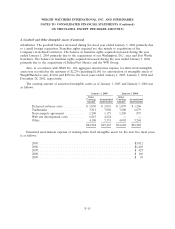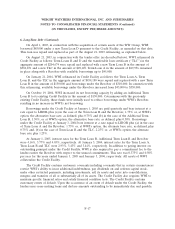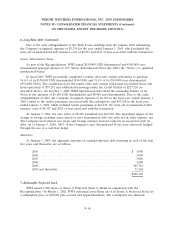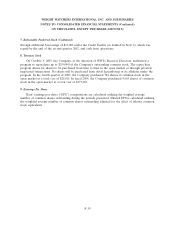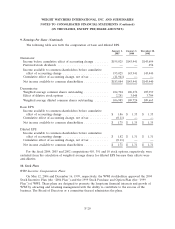WeightWatchers 2004 Annual Report Download - page 73
Download and view the complete annual report
Please find page 73 of the 2004 WeightWatchers annual report below. You can navigate through the pages in the report by either clicking on the pages listed below, or by using the keyword search tool below to find specific information within the annual report.WEIGHT WATCHERS INTERNATIONAL, INC. AND SUBSIDIARIES
NOTES TO CONSOLIDATED FINANCIAL STATEMENTS (Continued)
(IN THOUSANDS, EXCEPT PER SHARE AMOUNTS)
2. Summary of Significant Accounting Policies (Continued)
Deferred Financing Costs:
Deferred financing costs consist of fees paid by the Company as part of the establishment,
exchange and/or modification of the Company’s long-term debt. During the fiscal years ended
January 1, 2005 and January 3, 2004, the Company incurred additional deferred financing costs of
$2,896 and $2,366, respectively, associated with the refinancing of its Credit Facility (as defined in
Note 6). Such costs are being amortized using the interest rate method over the term of the related
debt. Amortization expense for the fiscal years ended January 1, 2005, January 3, 2004 and
December 28, 2002 was $1,308, $1,248 and $1,313, respectively. In connection with the early
extinguishment of over 90% of its Senior Subordinated Notes, the Company wrote off $4,387 of
deferred financing costs in the fiscal year ended January 3, 2004. Additionally, in connection with the
refinancing of its Credit Facility, the Company wrote off deferred financing costs of $2,933 and $4,659
in the fiscal years January 1, 2005 and December 29, 2001, respectively. These amounts have been
recorded as a component of early extinguishment of debt. See Note 6 for details of the early
extinguishment and refinancing.
Comprehensive Income (Loss):
Comprehensive income (loss) represents the change in shareholders’ equity (deficit) resulting from
transactions other than shareholder investments and distributions. The Company’s comprehensive
income (loss) includes net income, changes in the fair value of derivative instruments and the effects of
foreign currency translations. At January 1, 2005 and January 3, 2004, the cumulative balance of
changes in fair value of derivative instruments, net of taxes, is ($70) and ($270), respectively. As of
January 1, 2005 and January 3, 2004, the cumulative balance of the effects of foreign currency
translations, net of taxes, is $5,864 and $6,536, respectively.
Stock Based Compensation:
In December 2002, the FASB issued SFAS No. 148, ‘‘Accounting for Stock-Based Compensation—
Transition and Disclosure,’’ an amendment of SFAS No. 123, ‘‘Accounting for Stock-Based
Compensation.’’ SFAS No. 148 provides two additional alternative transition methods for recognizing
an entity’s voluntary decision to change its method of accounting for stock-based employee
compensation to the fair value method. In addition, SFAS No. 148 amends the disclosure requirements
of SFAS No. 123 so that entities following the intrinsic value method of Accounting Principles Board
Opinion No. 25, ‘‘Accounting for Stock Issued to Employees’’ (‘‘APB 25’’), will be required to disclose
the pro forma effect of using the fair value method for any period for which an income statement is
presented. The disclosures are required to be made in annual financial statements and in quarterly
information provided to shareholders without regard to whether the entity has adopted the fair value
recognition provisions of SFAS No. 123. The Company adopted the disclosure provisions of SFAS
No. 148 beginning in the first quarter of 2003.
At January 1, 2005, the Company had stock-based employee compensation plans, which are
described more fully in Note 10. As permitted by SFAS No. 123, the Company applies the recognition
and measurement principles of APB 25 and related interpretations in accounting for those plans. No
compensation expense for employee stock options is reflected in earnings, as all options granted under
the plans had an exercise price equal to the market value of the common stock on the date of grant.
F-11


